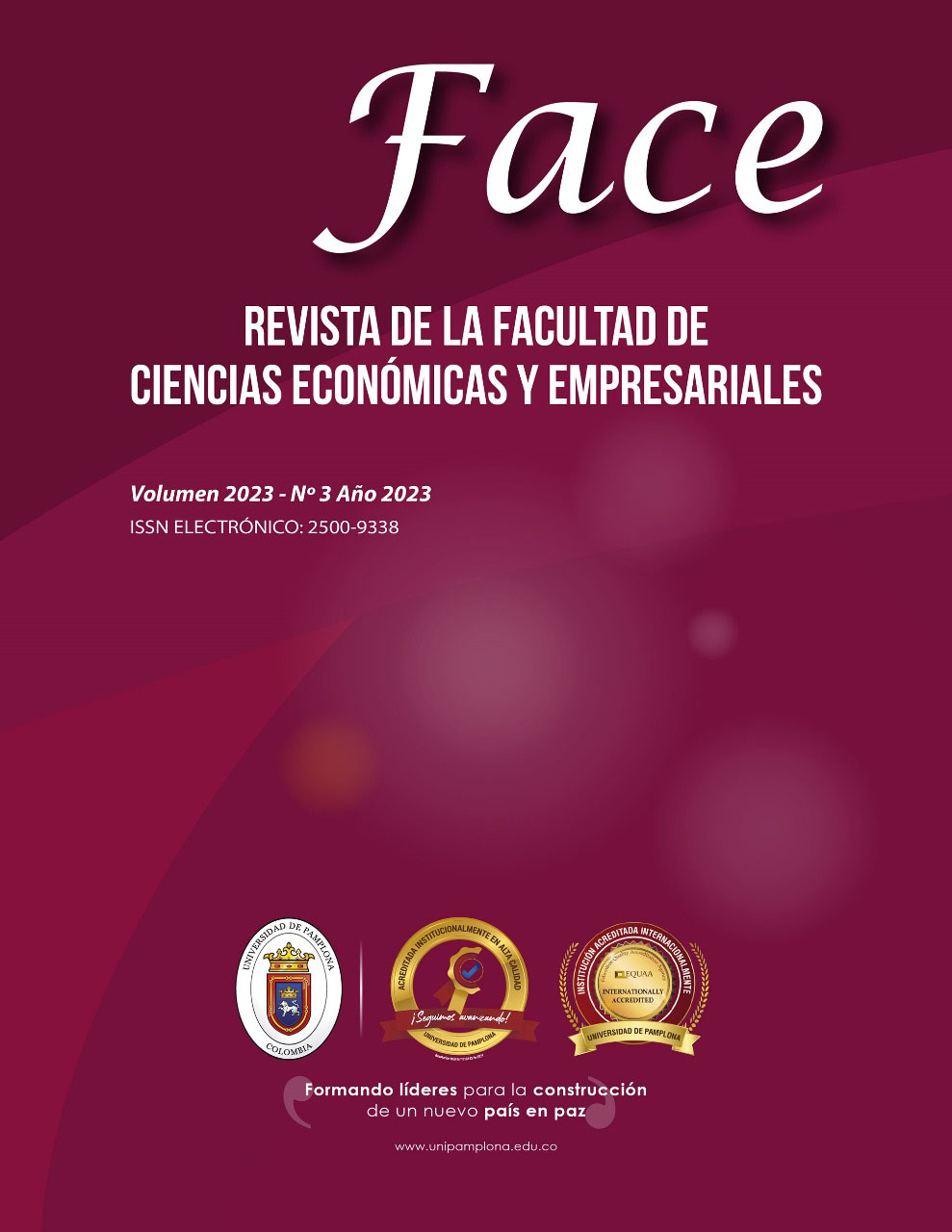Cátedra de los objetivos de desarrollo sostenible como iniciativa de cambio
DOI:
https://doi.org/10.24054/face.v23i3.2835Palabras clave:
ODS, Investigación, Acción, Participación, Santa Marta, CambioResumen
El trabajo se centra en los Objetivos de Desarrollo Sostenible (ODS), los cuales representan los desafíos de los países para mejorar las condiciones de vida de sus habitantes. La ciudad de Santa Marta, tanto en su área urbana como rural, enfrenta dificultades en el logro de estos objetivos. Por esta razón, el objetivo principal de este trabajo es implementar una cátedra que sirva como un llamado para involucrar a participantes y llevar a cabo acciones orientadas a alcanzar estas metas en su entorno.
Para diseñar el curso, se emplea la metodología de investigación acción-participación, considerando la naturaleza y los lineamientos de la cátedra. El caso de estudio se desarrolla en un colegio público en el corregimiento de Bonda, ubicado en el área rural de Santa Marta. La población atendida son niños de entre 14 y 17 años, pertenecientes a familias campesinas e indígenas de estratos 0, 1 y 2, cursando los grados 9, 10 y 11.
Los resultados de la evaluación de la cátedra muestran un alto cumplimiento del objetivo de la actividad, con un nivel de satisfacción del 74% muy alto, 17% alto y 9% aceptable. Se observa un efecto positivo en los participantes, con niveles de satisfacción del 40% muy alto, 54% alto y 6% medio. Respecto a la duración del efecto de la cátedra, se destaca que el 34% reporta que dura toda la vida, el 40% más de dos años, el 20% un año y el 6% menos tiempo. Además, el 100% de los asistentes expresaron que el principal impacto de la cátedra se relaciona con la mejora de las condiciones de vida.
Además, se identifican cuatro actividades que tienen un impacto leve en los Objetivos de Desarrollo Sostenible 4, 6, 12 y 13 en el entorno de los estudiantes. En conclusión, se destaca la viabilidad del desarrollo de esta cátedra como una iniciativa de cambio.
Descargas
Referencias
Alcaldía Distrital de Santa Marta. (2020). Plan de Desarrollo 2020 - 2023. Santa Marta Corazon del Cambia. Santa Marta: Alcaldía Distrital de Santa Marta.
Álvarez, L., & Padilla, A. (2016). Cátedra de la paz en Colombia: una mirada que supera la tiza y el tablero. Revista Boletín Redipe, 5(9), 168-174. Obtenido de https://revista.redipe.org/index.php/1/article/view/147
Bergman, Z., Bergman, M., Fernandes, K., Grossrieder, D., & Schneider, L. (2018). The contribution of UNESCO chairs toward achieving the UN sustainable development goals. Sustainability, 10(12), 4471. doi:https://doi.org/10.3390/su10124471
Camargo, L., Gómez, J., & Gasca, M. (2020). La ciudad inteligente y la gestión de las TIC. Caso de estudio: ciudad de Santa Marta.
Santa Marta: Editorial UniMagdalena. Obtenido de https://editorial.unimagdalena.edu.co/Editorial/Publicacion/4153
Cardozo, A., Morales, A., & Martínez, P. (2020). Construcción de paz y ciudadanía en la Educación Secundaria y Media en Colombia. Educação e Pesquisa, 46(1), e214753. doi:https://doi.org/10.1590/S1678-4634202046214753
CONPES 3918 (El Consejo Nacional de Política Económica y Social 15 de Marzo de 2018). Obtenido de https://colaboracion.dnp.gov.co/cDT/Conpes/Económicos/3918.pdf
Decreto 280 (Presidencia de la Republica 12 de febrero de 2015). Obtenido de www.funcionpublica.gov.co/eva/gestornormativo/norma.php?i=66611
DNP. (16 de Marzo de 2018). Departamento Nacional de Planeación. Obtenido de Las 16 grandes apuestas de Colombia para cumplir los Objetivos de Desarrollo Sostenible: https://2022.dnp.gov.co/Paginas/Las-16-grandes-apuestas-de-Colombia-paracumplir-los-Objetivos-de-DesarrolloSostenible.aspx
Gallopín, Gilberto. (2003). Sostenibilidad y desarrollo sostenible: un enfoque sistémico. Santiago de Chile: Cepal. Obtenido de https://hdl.handle.net/11362/5763
Marujo, H., & Casais, M. (2021). Educating for public happiness and global peace: Contributions from a portuguese UNESCO chair towards the sustainable development goals. Sustainability, 13(16), 9418. doi:https://doi.org/10.3390/su13169418
Naciones Unidas. (2015). Objetivo de Desarrollo Sostenible. Obtenido de https://www.un.org/sustainabledevelopment/es/objetivos-de-desarrollo-sostenible/
Nhamo, G., & Mjimba, V. (2020). Sustainable development goals and institutions of higher education. Berlin: Springer. Obtenido de
https://link.springer.com/book/10.1007/978-3-030-26157-3
Reason, P., & Bradbury, H. (2001). Handbook of action research: Participative inquiry and practice. Nueva York: Sage Publications. Obtenido de https://www.embracingcomplexity.com/wpcontent/uploads/2020/02/handbook_of_action_research.pdf
Salazar, J., Vergara-Romero, A., Sorhegui-Ortega, R., & Garnica-Jarrin, L. (2021). Repensando el Desarrollo Sostenible en el territorio. Res non verba revista científica, 11(1), 19-33. doi:https://doi.org/10.21855/resnonverba.v11i1.500
Selener, D. (1997). Participatory action research and social change. New York: Cornell University Participatory Action Research Network.
United Nations. (2015). Resolution adopted by the General Assembly on 25 September 2015, Transforming our world: the 2030 Agenda for Sustainable Developmen. New York: General Assembly. Obtenido de https://upload.wikimedia.org/wikipedia/commons/d/d5/N1529189.pdf
United Nations. (2017). Resolution adopted by the General Assembly on 6 July 2017, Work of the Statistical Commission pertaining to the 2030 Agenda for Sustainable Development. New York: General Assembly. Obtenido de https://documentsddsny.un.org/doc/UNDOC/GEN/N17/207/67/PDF/N1720767.pdf?OpenElement
Publicado
Número
Sección
Licencia
Derechos de autor 2023 Maira Gasca,Byron Medina,Luis Camargo

Esta obra está bajo una licencia internacional Creative Commons Atribución-NoComercial-CompartirIgual 4.0.





